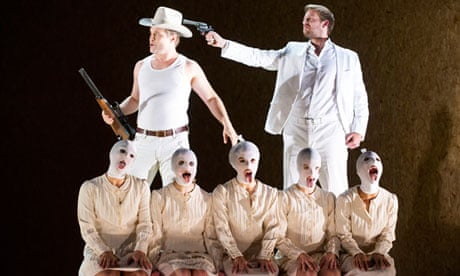English National Opera's troublesome new staging of Handel's Julius Caesar is the work of Michael Keegan-Dolan, the Irish choreographer and founder of Fabulous Beast Dance Theatre with which this is a co-production. Purists will doubtless take umbrage at the idea of transforming Handel's opera into a piece of music-cum-dance theatre, though it can work exceptionally well, as David McVicar's Bollywood-style Glyndebourne production, choreographed by Andrew George, amply demonstrated.
Keegan-Dolan's modern-dress version, however, is hamstrung by problems of interpretation and dramatic integration. The work itself is about sex and politics. It deals with the absorption of a kingdom into an empire, depicted as a game of erotic manipulation on the part of their respective rulers. Keegan-Dolan's treatment of the underlying issues is fitful and, at times, awkwardly symbolist.
The plywood set suggests a desert landscape. At the start, the performers are all dressed in similar white suits or frocks, and are only differentiated as Romans or Egyptians by donning grey or black costumes later on. At one point, Lawrence Zazzo's gun-toting Caesar wears a Stetson, JR Ewing-style, though the resulting equation of the US with imperial Rome is never followed through. There's no indication of who rules what or whom. There is, however, a lot of stylised gore as buckets of blood are thrown about, a crocodile – the Renaissance emblem of deceit – is disembowelled, and a dead giraffe has its tongue ripped out.
Keegan-Dolan seems less interested in the relationship between Zazzo and Anna Christy's petulant Cleopatra than in the sparring between Patricia Bardon's traumatised Cornelia and Andrew Craig Brown's brutally handsome Achilla. Sesto (Daniela Mack) is contentiously played as a woman rather than a man, though the transformation from victim to assassin is finely observed. The dances, meanwhile, with their mix of curtseys, bows and pastoral, effortlessly elide baroque with contemporary dance, but seem extraneous to the action rather than integral to it.
Musically, things are less precarious. Vocally as well as dramatically, Mack, Craig Brown and the sensational Bardon give the finest performances, along with Tim Mead as a truly creepy Ptolemy. Zazzo sounds beautiful but could occasionally be more incisive, though Christy lacks the allure in tone Cleopatra ideally needs. Christian Curnyn's conducting, as one might expect, is wonderfully passionate. But the evening never coheres into anything like a satisfactory whole. Disappointing.

Comments (…)
Sign in or create your Guardian account to join the discussion